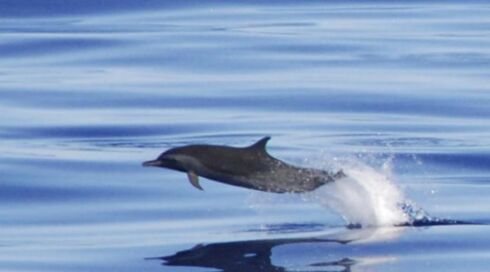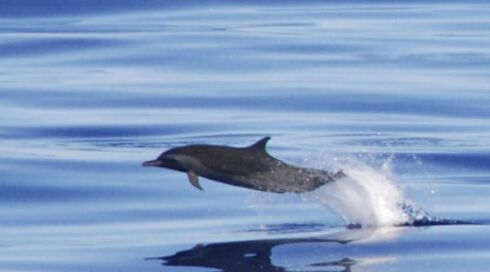6 November 2014
Magnificent creatures
Without a doubt people have love for the ocean and its fauna. It’s unimaginable the quantity of marine mammals you see out in the ocean, which are some magnificent sea creatures. On the other hand, many people in the offshore industry, despite the hype of their job, don’t understand that these activities can have impacts on marine mammals. Kyla Graham is a Marine Mammal Observer who lives to raise awareness of marine wildlife in the offshore industry. She is a proud Canadian who studied her Masters in Marine Mammal Science at the University of St Andrews, Scotland Victoria. Emerged as a finest Marine Mammal Observer (MMO) and Passive Acoustic Monitor operator (PAM) in an industry where she never would’ve imagined working for. “I always imagined myself working in non-profit work, which I did for years and mostly voluntarily. The reality is that people with the knowledge I have can make a career in this industry and do a good job applying the skills they have gained from their experience in non-profit work to help mitigate the potential impacts to marine mammals from this industry”.
Benefits of being an offshore MMO
Many marine mammal observers like Kyla appreciate the rare opportunity to collect data on offshore marine wildlife in locations (renewable energy sites) where it would normally be very expensive to do research. Nonetheless, data collection is not the only benefit; Kyla feels very fortunate for her job because of the chance there will be rare and unexpected observations. “I get to observe wildlife! Including not only marine mammals but also, birds, fish, sea turtles and even bats! I love the travelling and the opportunities my job provides for me. I jump out of bed most mornings in anticipation of what I will see that day. I spend many hours looking at the sea but it’s those special moments when I spot dolphins or a whale blow on the horizon that truly keep me going! I will never forget my first sighting of beaked whales; imagine observing a rare species of beaked whales travelling with dolphins and pilot whales off the coast of East Africa. Or humpback whales during the breeding and calving season off West Africa”.
A world ruled by men
One question that comes to mind for many prominent professionals within this industry is what women think of it. How do these women feel to be working in an industry that is made up, by a great majority, by men? This could be challenging especially being the person that often calls for the project to be stopped forsome time (20-40mins) to mitigate for the presence of marine wildlife). Despite many assumptions, Kyla, who has worked offshore for over five years plus another nine years in marine research, explains her point of view. “In spite of what people might think, I’ve had hardly any situation where companies don’t comply with mitigation procedures. The non-compliances I’ve experienced have mostly been due to either environmental conditions, e.g. currents, human error or mechanical problems. Moreover, I find men very respectable towards the few of us women who are onboard. I think the days are mostly gone when it was considered odd to see women offshore. I’ve even been told that many of the crew even prefer when there are women onboard because other crew take better care of themselves. Also, they are usually very willing to help women with setting up our equipment especially if we are unfamiliar with the vessel. Of course, that being said, it is a world of men and I do have to adapt. I must say, that after a few weeks offshore with the guys I am quite happy to come home and spend time with my women friends again”.
The Industry & HSE
The offshore industry has faced many changes over the years and in her time Kyla has not just seen that these changes have been implemented for strong development of the industry but also a continua emphasize in the development of Health, Safety and Environment (HSE) measures, much of it voluntarily. “It appears that more companies are taking on MMOs and PAM operators, even in regions where they are not even required. As well, many seismic companies have started to work on integrating PAM systems within their hydrophone cables; which will help both seismic crews and PAM operators do a better job with marine mammal mitigation. Currently, PAM equipment is deployed separately around the ship’s equipment and the PAM cables can become entangled with the vessel’s cables during periods of high swell or strong current resulting in loss of time and equipment”.
Raising awareness
There is no doubt that certain sectors within this industry can harm marine wildlife (e.g. Seismic & Electromagnetic). The vessels used for most of these ventures transmit what Kyla calls as Anthropogenic, or human made, noise; this noise can cause either direct physical impacts (in close proximity to the sound source) or behavioural impacts (both close and further from the source) to marine wildlife For example, behavioural impacts could occur when the sound source is louder than marine mammal calls thus creating a barrier, or masking the communication between members of a population. In other words, if mitigation measures are not carefully applied the noise can alter their environment and have impacts to their habitat. “I have never felt much stressed with working with these companies because they frequently comply with the mitigation measures. The most frustrating part of my job might be explaining why we are actually there. Most of the crew don’t understand why the mitigation requirements are important, especially when they have seen marine mammals purposely approaching the sound source. Which still impact them even though we cannot directly see or understand what physical or behavioural impacts might result from such interactions. I often tell the crew this could be compared to going to a rock concert; even though we voluntarily expose ourselves to loud noise at a concert, such exposure can still result in hearing loss even though we weren’t aware of it at the time. I’ve been quite happy helping them understand and it makes me feel like I’ve done a good job when I see the crew get enthusiastic and interested in the wildlife. Once the crew start to appreciate and understand the animals then they will also have a better understanding of why it is important to mitigate”.
.png)
.png)

